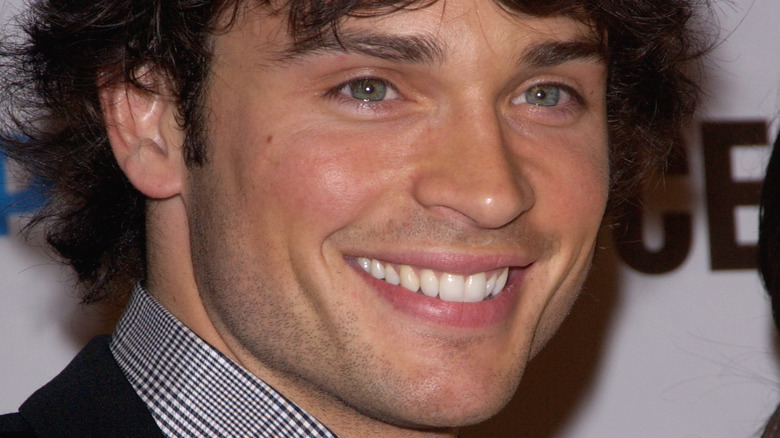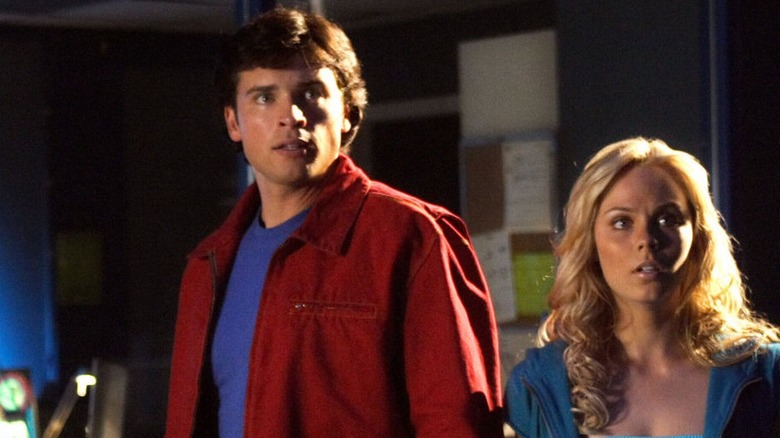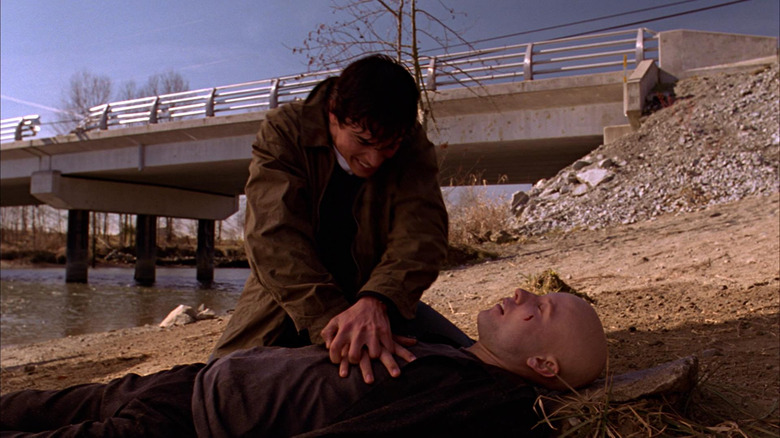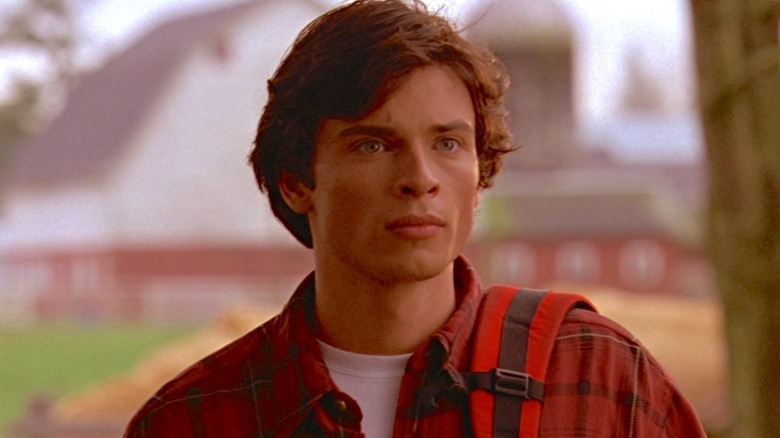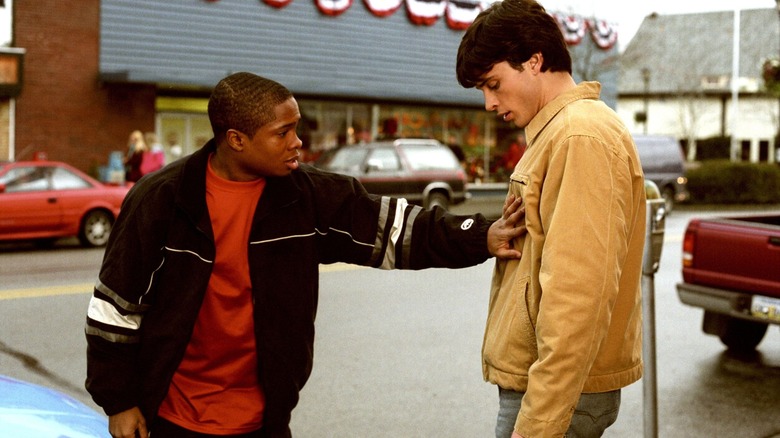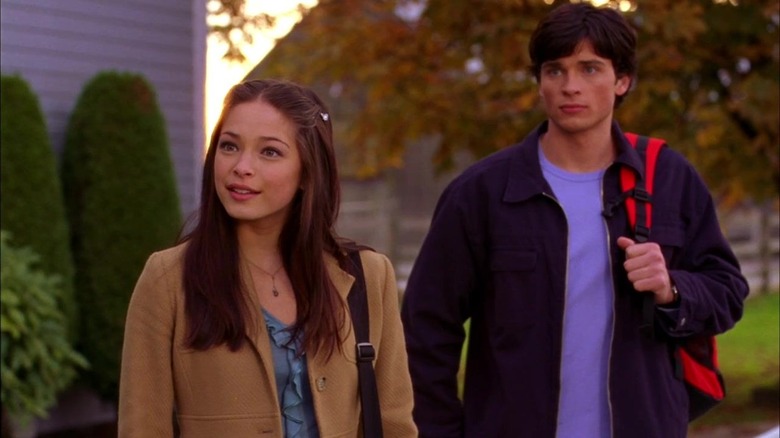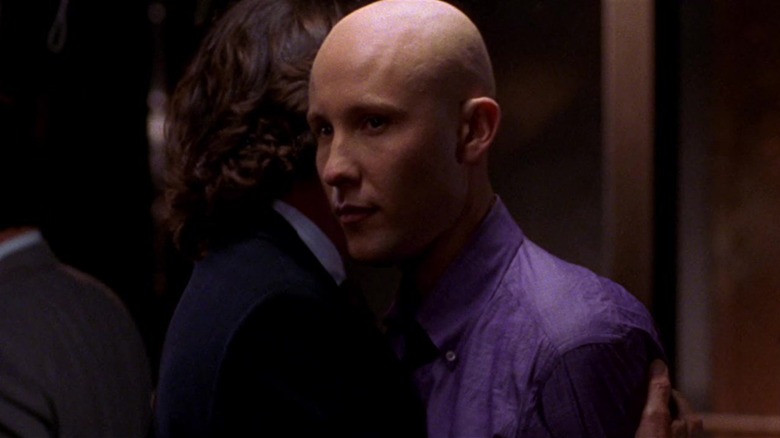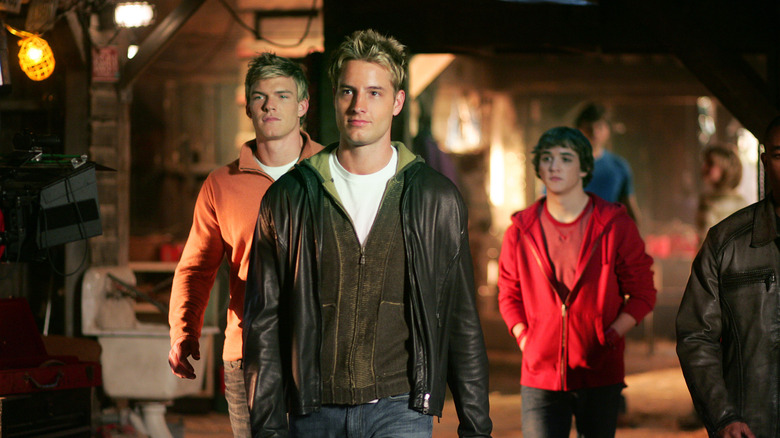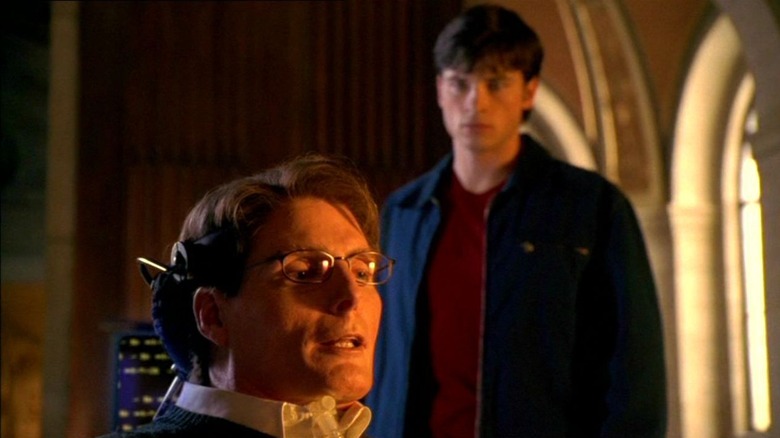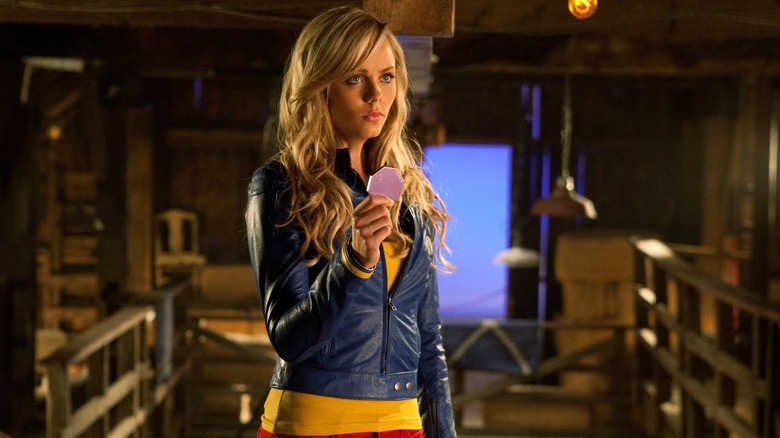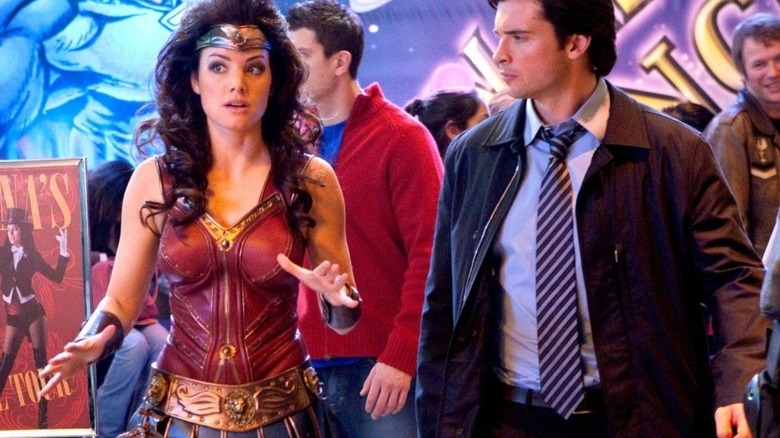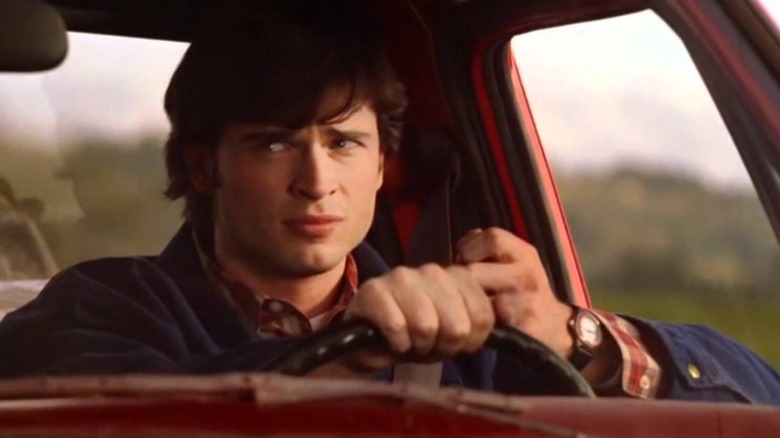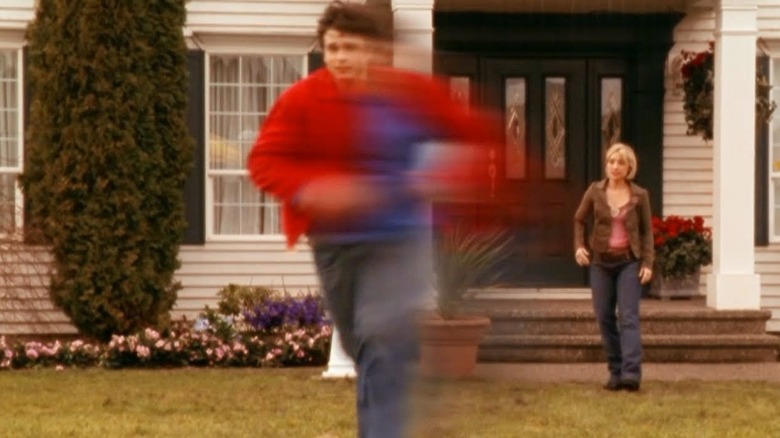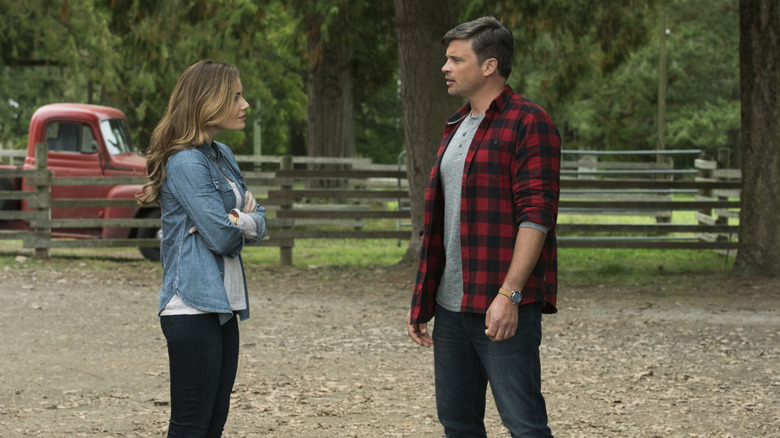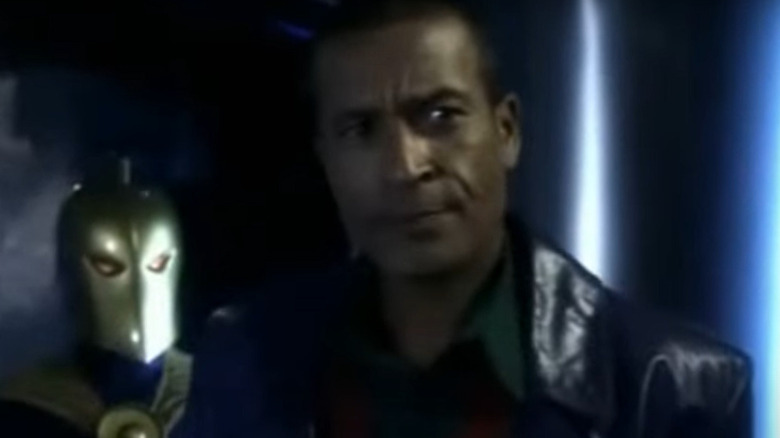The Untold Truth Of Smallville
Today the Marvel Cinematic Universe is held up as the gold standard for the concept of live-action interconnected superhero stories. But while the oft-maligned DC cinematic universe has struggled to catch up with the MCU, the truth is DC Comics jumped on the trend much earlier with their television shows — specifically 2001's "Smallville."
The series follows the adventures of a young Clark Kent (Tom Welling) growing up in a small town in Kansas years before he becomes Superman. Along with dealing with his friends and enemies, Clark also copes with his secret heritage as an alien blessed with all sorts of amazing powers. Part superhero show, part teen drama, "Smallville" laid the groundwork for what would one day become the CW's "Arrowverse," a live-action television superhero universe based on DC Comics.
With an impressive 10 seasons to its credit, "Smallville" was a trendsetter in a lot of ways, for both DC adapted media and for superhero television in general. The series is still regarded in a positive light by fans and considered a classic of its genre. Let's look at some lesser-known facts about the making of "Smallville" before the series reached its conclusion in 2011.
No tights, no flights
One thing audiences quickly noticed about "Smallville" is despite being the story of a young Superman, you never see Clark wearing his iconic red-and-blue tights, and we only rarely see him fly. This was no accident; rather, it's the result of a decision made by the showrunners to tell a more grounded story about the Man of Steel.
Back when "Smallville" was still being pitched to the studio, its creators Alfred Gough and Miles Millar had a motto for what the show would not be about — "no tights," and "no flights." Clark Kent would never wear the Superman suit or fly throughout the run of the show. "It is difficult to really connect with someone wearing their underpants over their tights," co-creator Alfred Gough explained in an interview with The Washington Times. In the same chat, the other "Smallville" co-creator Miles Millar described the iconic red cape as "cheesy."
These two mandates set by Gough and Millar stayed in effect to varying degrees after they left the show. While Clark eventually starts flying, most of the time, he just runs incredibly fast. And he doesn't put on the red-and-blue Superman costume until the end of the series finale when Clark runs to the top of the Daily Planet building to change into his suit before rescuing a plane that's about to crash.
A long road to creation
On its face, the grounded, realistic approach that "Smallville" takes to telling a superhero story without any costumes or overt displays of superpowers seems better suited to a character like Batman. This is no coincidence, since the original intention was to make a series about a young Bruce Wayne's journey to becoming Batman.
In 1999, the "Batman" franchise was under the weather after the wildly negative reaction to the 1997 movie "Batman and Robin." That was when scriptwriter Tim McCanlies pitched the idea of a television series focusing on a young Bruce Wayne in the years before he becomes the Dark Knight. The studio responded positively to the idea, and a script was created for the pilot of the series that sees Alfred Pennyworth narrating the events of the main plot involving Bruce investigating his father's company for possible ties to the Gotham underworld.
But then Warner Bros. started putting plans together to create a new, more serious film about the Caped Crusader based on the classic "Batman: Year One" comic series. Since Warner Bros. didn't want the movie to compete with the show, the base concept for the latter was retooled into an origin story for Superman instead.
Tom Welling was not a big Superman fan
The biggest wild card with regards to the success of "Smallville" was the casting of Clark Kent. Superman is one of the most instantly recognizable pop culture icons around the globe, and the series needed to find someone who would be able to embody the legend and still carve out his own identity as teenage Superman.
After a lot of auditions, the creators of "Smallville" zeroed in on then-unknown actor Tom Welling. While Welling had some big shoes to fill when it came to playing such an iconic character, the actor decided to strike out his own path. "I actually made the choice when preparing for this role not to do research on anything else that has been done with this character," Welling explained in an interview with Seattle Post-Intelligencer. "To really just take it from a fresh standpoint and create its own image."
In another interview with TeenMag, Welling admitted that he did not read a lot of Superman comics growing up. For these reasons Welling entered into the role of Clark Kent without a lot of the cultural baggage associated with Superman and his fandom and was able to create a fresh take for a new generation of fans.
Tom Welling initially turned down the role
Going into making "Smallville," newcomer actor Tom Welling was unburdened by the massive cultural heft of his new starring role. In fact, Welling cared so little about the momentous nature of playing Superman that he actually turned down the role when it he was initially asked to read for it.
"[The chance to audition for] this show 'Smallville' came along, and they weren't releasing the script," Welling explained to The Hollywood Reporter. "They just wanted me to audition. My manager at the time says, 'That either means they don't have a script, or it's not very good.' We turned it down."
While the actor was unwilling to audition without a script, the showrunners thought he had the potential to play a really compelling Clark Kent. Finally, Welling was allowed to read the script after signing a nondisclosure agreement. That's when the actor realized that the show was not about a superhero "running around in tights," but a high school kid trying to discover himself. That's what convinced Welling to take on the role despite his initial misgivings.
The romance that outlasted its welcome
"Smallville" is a show about Superman during his teenage years before he moves to Metropolis and becomes a superhero. That meant that the show initially couldn't include one of the most iconic parts of the "Superman" mythology — his love story with Lois Lane, who he famously meets on the staff of the Daily Planet, one of Metropolis' premiere news outlets. In place of Lois, "Smallville" explores Clark's high school romance with Lana Lang, played by Kristin Kreuk.
At first, a major part of the dynamic between Lana and Clark is the latter's inability to tell her the truth about his identity. Despite Clark lying to Lana on a routine basis, the two eventually get together. Then they break up, then get together again, and so on. If Ross and Rachel have a superhero equivalent, it's these two. Gough and Millar even admitted in an interview with Sundance (via MovieChat) that the Clark-Lana relationship runs its course and carries on for much too long.
"I wish we had a better trajectory for Lana Lang," Gough stated. "That was probably a three-season love story that lasted six seasons." Millar also described the relationship as "torturous and slow," especially since the will-they-won't-they aspect of the relationship was doomed from the start — everyone knows Clark eventually ends up with Lois Lane anyway.
Michael Rosenbaum emodied Lex off-screen
"Smallville" might have its critics among the DC fandom, but it's hard to argue against the series' iteration of Lex Luthor. Michael Rosenbaum played a very different version of the quintessential supervillain than the one typically seen in the comics. This Lex grows up with Clark in Smallville and considers the Last Son of Krypton his brother from another mother until discovering his secret.
Witty, calculating, and effortlessly charismatic, Rosenbaum's Lex is one of the best depictions of the character in any live-action film or series. And it seems the actor did a little bit of method acting by embodying his character when the cameras weren't rolling.
"I went into the auditions and just took over," Rosenbaum recalls in an interview with Titan Magazines (via The Superman Homepage). "I felt really confident, because I had nothing to lose."
Rosenbaum recalled passing a message to the producers of the show asking what exactly they wanted the actor for Lex to bring to the table. Based on the studio notes, Rosenbaum circled out the parts of the audition script where he would be alternately funny, brooding, and menacing. After the producers asked Rosenbaum to come back for another screen test, he unleashed Lex's classic arrogance and told the studio that he would not audition again because the first time went so spectacularly. The gambit worked, and Rosenbaum was soon hired to play Lex Luthor.
Some failed attempted spinoffs
What made "Smallville" particularly exciting for fans of DC Comics was that the show made liberal use of characters from the comics outside of Superman's personal mythology. Over the course of the show, Green Arrow, Aquaman, Impulse, Zatanna, J'onn J'onzz, and various other Justice League and Justice League-adjacent superheroes swing into the fray.
In particular, Oliver Queen, aka Green Arrow, played by Justin Hartley, proved a big hit with fans. After a disappointing effort to launch Hartley as his era's Arthur Curry with an infamous failed pilot for an "Aquaman" series, the minds behind "Smallville" brought Hartley into the "Smallville"-verse as the Emerald Archer. Rich, handsome, charming, and highly skilled at hand-to-hand combat, Oliver more-or-less takes the place of Batman on "Smallville." Green Arrow was such a breakout character that there were talks of him getting his own show. "There were several different spinoff ideas that [the studio] had," Hartley told Michael Rosenbaum on his podcast (via Screen Rant). "They wanted to do a spinoff called Metropolis. ... It was Lois and Oliver in Metropolis and whatever that was."
Getting the blessing of Christopher Reeve
When "Smallville" came onto the scene, the most famous depiction of Superman was without question that of the late Christopher Reeve. Therefore, it was inevitable that Tom Welling and "Smallville" by extension would be held up to the standard set by Reeve's "Superman" films. Fortunately, fans saw Reeve give his blessings to the show when he appeared on it in a brief supporting role as Virgil Swann, a scientist who helps Clark discover his alien heritage. "I was a little skeptical [about the show] until I saw a few episodes," Reeve said in an interview. "The writing and the special effects are remarkable."
Not only did Reeve give his seal of approval to "Smallville," but he was impressed enough with Welling's portrayal of Clark to express a wish to see the actor play Superman in a movie. "I remember [after filming our scene together, Reeve] says to me, 'I'm really glad they chose you to be the next Superman,'" Welling told Michael Rosenbaum (via CBR). "I was like, 'Well, they didn't.' That's when Brandon [Routh] had gotten the role [in the 2006 film 'Superman Returns']. And he said, 'Well they should have.'"
Laura Vandervoort really hated her Supergirl costume
Years before Supergirl got her own show with Melissa Benoist as the Maid of Steel, she was a big part of "Smallville." Played by actress Laura Vandervoort, this version of Supergirl was Clark Kent's Kryptonian cousin named Kara Zor-El and appears regularly throughout Season 7.
At first Kara is depicted as an antagonistic force due to her alien nature. But eventually she is influenced by her cousin's human values and becomes a hero at his side. Unfortunately, as is an all-too-common issue for female characters in the action-fantasy genre, the decision makers behind "Smallville" put Vandervoort in outfits some folks might describe as needlessly skimpy, especially considering Supergirl's largely wholesome reputation and background. For her part, Vandervoort detested wearing the costumes picked out for Kara and wanted to set fire to them.
"I did ask them to burn the wardrobe when I was done with the show," Vandervoort admitted during a virtual panel interview (via Screen Rant). "I would've personally liked to have done it."
The missing Trinity
In DC Comics, Superman, Batman, and Wonder Woman are considered the main "Trinity" that all the other superheroes look up to. The members of the Trinity share a close bond. Unfortunately, that bond could not be explored on "Smallville."
Even back in the early 2000s, Warner Bros. had plans to use Batman and Wonder Woman in their own movies and TV shows and forbade the makers of "Smallville" from using either of the characters. In fact, the closest "Smallville" ever gets to Wonder Woman is Lois Lane dressing up as an Amazon princess for a costume party.
Nowadays, studios are much more willing to blur the lines between their franchises, and Tom Welling feels they missed an opportunity to add the other parts of the Trinity into the "Smallville" mythos, especially Batman. "I wish I would've pushed for Bruce Wayne to somehow cross through Smallville," the actor told TVLine. "Like, I really wish Clark could've gone into Lex's mansion, in his office, and Lex is like, 'Clark, how'd you get in? This is my friend, Bruce Wayne...'"
The cast rallied behind Tom Welling
"Smallville" has a lot of important characters, but at the end of the day, the most important character in the entire show was Tom Welling's Clark Kent. From the first episode to the series finale, Welling holds the narrative of the entire show together and is present in almost every major scene.
This meant that the actor was under a tremendous amount of pressure while making the show. Welling slogged away for long working hours on the series and was left bone tired by the end of each shooting day. In fact, the cast of "Smallville" was so worried about Welling's health that they rallied together to sign a petition demanding that the studio assign him a driver so he wouldn't have to drive himself home after work every day.
"All of us are driving to a location at 4:30 a.m. with one eye open and you're in every scene," Michael Rosenbaum told Tom Welling during a podcast (via Just Jared). "I think it got to a point where we all like signed a letter for you because we're like 'You're going to kill Superman.'" Welling also recalled the incident and revealed that the rest of the cast waived their rights to have a personal driver provided by the studio just so Welling could get one.
Figuring out the superpowers
While "Smallville" is rightly praised for its acting and providing a grounded story for the Man of Steel, the show was also a trendsetter when it came to special effects on the small screen. Until the late '90s, good special effects were considered the domain of big budget action movies, while TV special effects were generally considered cheap and cheesy.
In order to make "Smallville" work, its creators had to pull off something much more complicated than simply using lots of CGI. Each of Clark Kent's superpowers needed to be shown in different ways, and the production had to figure out the logistics of making Clark run at superspeed, shoot heat vision from his eyes, use freeze breath, and perform any number of other spectacular feats.
"At one point I was on the back of a Ford pickup truck that, in the back, had a treadmill that I was running on [to simulate super speed]," Welling told THR. "Obviously that was dangerous. That was how we did it at the beginning. Then heat vision, X-ray vision — we were figuring it out as we went." These lessons and techniques provided an early blueprint for how the Arrowverse would tackle similar issues when it came to superpowers on a television budget.
The adventure continues
Ironically, while "Smallville" ran for 10 seasons, it still feels like it only scratched the surface of the stories it could tell since it ended just as Clark Kent officially assumes the role of Metropolis' greatest protector. Fans clamored to find out what happened to the characters of the show after the series finale of "Smallville," and the answer came in the form of a spinoff comic series that acts as an 11th season of "Smallville." In the "Smallville" comics, Clark has spent more than half a year as Superman while still keeping in touch with his friends from Kansas. Perhaps the biggest advantage the comic series has over the show is that it allows Batman and Wonder Woman to finally become part of the "Smallville" canon.
The saga of Tom Welling's Clark Kent doesn't end there. In 2019, Welling reprised his role as Clark Kent for The CW's mega-crossover event "Crisis on Infinite Earths." Recently, the actor announced that he is working together with Michael Rosenbaum to launch a "Smallville" animated series for a new generation of fans. While the project is still in the initial stages of development, Welling has stated that he is trying to get as many of the original cast members as possible to come back to voice their characters for the show.
Changing the comics
"Smallville" brings a number of comparatively obscure DC Comics characters to the small screen with slightly altered backstories. One such character was J'onn J'onzz, the Martian Manhunter, who debuted on "Smallville" played by actor Phil Morris.
Morris plays John Jones, a seemingly ordinary human who is secretly a Martian superhero. John was a friend of Clark's biological father and promised to look after the young Clark Kent when he was still an infant. In the comics, the Martian Manhunter's main human alter ego had traditionally been depicted as white. But the makers of "Smallville" decided to cast Morris in the role.
"I think the [Smallville] writers in their infinite wisdom cast him as African-American because he really is a man on an island, as is Kal-El," Morris told If Magazine (via Buddy TV). "That's their one relating point is that they are both the last of their race stuck on another planet with these crazy humans." Morris' run as the Martian Manhunter ended up permanently impacting the comics; these days, J'onzz primarily takes the form of a Black man when he's in his civilian identity. Since "Smallville," other Black actors, including Harry Lennix and David Harewood, have played the part of the Manhunter from Mars.
